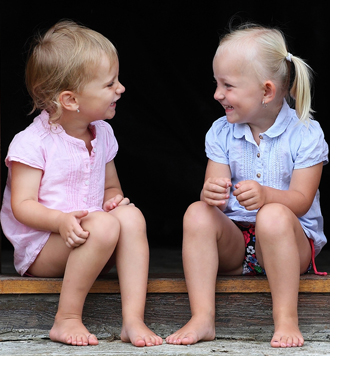
Children Who Understand Others' Perspectives Found to Be More Popular Among Peers
April 15, 2015—Preschoolers and school-age children who are good at identifying what others want, think, and feel are more popular in school than their peers who aren't as socially adept. That's the conclusion of a new meta-analysis--a type of study that looks at the results of many different studies--out of Australia.
The study was done at the University of Queensland, Australia, and appears in the journal Child Development.
"Our study suggests that understanding others' mental perspectives may facilitate the kind of interactions that help children become or remain popular," notes Virginia Slaughter, professor of psychology and head of the School of Psychology at the University of Queensland, who led the study. Popularity was measured via nominations by classroom peers and ratings by teachers.
The ability to figure out what other people are thinking and feeling comes into play in interpersonal interactions and helps us understand complex social situations, such as when one person double crosses another or uses sarcasm. This is also called theory of mind. While individual studies have shown an association with popularity in the past, this meta-analysis looked across the findings of multiple studies, increasing confidence that the overall pattern is clear.
In this work, researchers looked at 20 studies that addressed the relation between theory of mind and popularity. Together, the studies included 2,096 children from 2 to 10 years old from Asia, Australia, Europe, and North America. In all but three of the studies, most of the children were Caucasian, and although children across the 20 studies were from a mix of working-, middle-, and upper-class families, they were predominantly middle class.
In addition to finding an overall link between children's abilities to figure out what others think and feel and their popularity, the study found that this tie was similar for preschoolers and for older children. This suggests that understanding others' mental perspectives is important both for making friends in the early school years and for maintaining friendships as children grow older.
The study also found that the link was weaker for boys than girls, perhaps reflecting gender differences in how children relate to each other. For example, girls' friendships are often characterized by high levels of intimacy and resolving conflicts, which may mean that their interactions require more sensitivity in understanding others' thoughts and feelings.
"Our findings suggest that training children to be sensitive to others' thoughts and feelings may improve their relationships with peers," Slaughter adds. "This may be particularly important for children who are struggling with friendship issues, such as children who are socially isolated."
ARTICLE:
"Meta-Analysis of Theory of Mind and Peer Popularity in the Preschool and Early School Years," Slaughter, V, Imuta, K, Peterson, CC, Henry, JD. Child Development.
